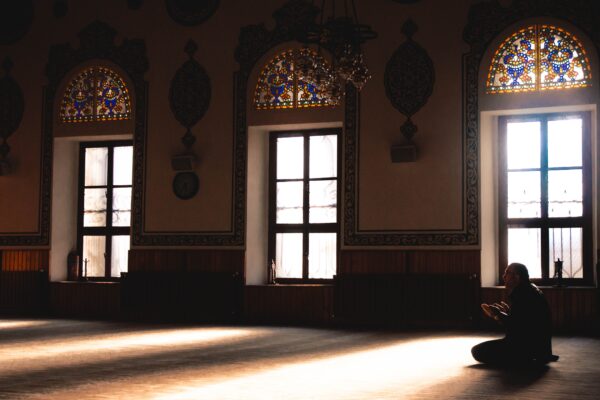Repentance – a beautiful journey back to God.
Repentance – a beautiful journey back to God.
“Come, come, whoever you are.
Wanderer, worshiper, lover of leaving.
It doesn’t matter.
Ours is not a caravan of despair.
Come, even if you have broken your vows a thousand times.
Come, yet again, come, come.”
― (attributed to) Jalaluddin Rumi
One of the most gratifying aspects of Touba (repentance) is the delight of navigating our way back to God. He meets our remorseful soul halfway and holds it in a soothing embrace. The journey consummates when we, ensconced in the hug of God, are lulled by a deepening sense of security and reassurance. Adding beauty to this emotional reunion is the realization that God has been eagerly and even desperately waiting for this moment of homecoming. Upon seeing His teary, conscience-stricken servant trudging towards Him, God’s delight knows no bounds that, according to a Prophetic Tradition, He feels like a traveller finding his lost dromedary in the middle of a waterless desert. This beautiful allegory captures the most fascinating aspect of repentance: when you set about seeking God, you come to realize that He is also searching for you more intimately. As God Himself admits, when we approach Him walking, He gets to us running.
The most beautiful thing about the journey to God is that it is at the same time a journey with Him. The moment we set foot on the path to God, we come to realize that He is very much with us, and we understand the value He attaches to our relationship with Him, as well as the high esteem He holds us in. We never find ourselves so desperately in need of God as we do while we return to Him, feeling guilty and full of remorse. That is why when we repent, we need to rely entirely on His boundless mercy and unconditional forgiveness, irrespective of the enormity and severity of our transgressions. Although repentance is all about redeeming and reinventing ourselves, we cannot make it without placing our trust in God; and when it comes to sins committed against fellow humans, we need to get their clearance even before approaching God. Repentance complements and reiterates our submission to God because while we repent, we are admitting to God’s absolute control over us. We recognize that He is privy to our innermost secrets, and invoke His help to edit out our records and keep our slate clean.
When we repent, we deepen our faith in God because repentance stems from a firm belief in the power of God’s mercy and forgiveness to prevail over our sins and transgressions. It’s inspired by the belief that even the weight of our sins could not wear the believer in us down, nor to weaken our resolve and determination. The realization that we believe in the Most Merciful, the Most Compassionate, and the Most Forgiving, and that our capabilities are invested in us by the Most Powerful, rescues us from falling prey to any sense of gloom triggered by our own mistakes.
God’s attributes, including His mercy, are too vast and superior to be diminished by our mistakes, no matter how severe they are. Therefore, no amount of sin should make a remorseful soul despair of God’s mercy, nor of its own potential to be reunited with its Lord. We cannot afford to underestimate any sense of remorse we feel during or after committing a sin, because each sin bears the potential of becoming the last wrong action decreed by God for us. As Ibn Ata Allah al-Iskandari says in Kitab al-Hikam, underestimating our capacity for repentance is tantamount to underrating Allah’s power to rescue us from a state of heedlessness. In other words, when we doubt the power of repentance in redeeming ourselves, we are doubting the power of God’s forgiveness and thereby staying back in our state of heedlessness. That is why regret over our mistakes and the fear of our fallibility are far more potent tools fueling our faith than complacency and arrogance stemming from a sense of self-appreciation. Repentance helps us to strike the perfect balance without sliding into arrogance or self-deprecation.
Liberation from the Shackles of Past
Repentance is a tool of liberation with enormous capacity to rescue our mind from an alarming sense of guilt verging on despair and depression. As long as our capacity to remember God and weep our hearts out remains intact, no past, however littered with sin it might be, can drive us into despair. As long as the God-breathed spirit of life effervesces in us, we can find a pathway to hope, even from the precipice of hopelessness. A spark of realization lasting only a split-second can awaken us from years-long sinful slumber and transform our life once and for all.
No matter how many days, months or years we squandered without fulfilling our obligations of gratitude and proving our mettle as a grateful servant of God, repentance helps us break our being free from that prison of the past and start our life afresh.
Even while we are genuinely remorseful for not utilizing our past more effectively, we cannot afford to let that regret mutate into despair, deterring us from making the best use of what is left in us. Looking back, the past is seen as a sprawling graveyard of wasted opportunities and of dreams that never materialized. But we cannot hold ourselves a prisoner of that sorry spectacle, no matter whether we missed those opportunities because of our bad choices or due to sheer bad luck.
The optimism generated by repentance is the most potent tool rescuing us from collapsing into despair and depression. It saves us from being imprisoned by our mistakes in the past. For those who place trust in the forgiveness of God, the future carries more weight and holds brighter prospects than the past. While every second in the future bears the potential for God to turn us into the purity of a newborn, we cannot afford to remain in the past’s prison. Repentance liberates us from the weight of the past entangling us and of which we want to disavow. It filters out impurities from our past and enables us to resume life in a completely clean state. It rescues us from a burdensome past, brings us back to a free present, in its pristine and uncluttered form, and makes us look clear-eyed into the future.
Practicing repentance also liberates us from the linear conception of time- the teleological flow from the past to the future. With repentance giving us the freedom to correct our mistakes, the past is no longer a static entity we left behind. The past becomes the future that we keep building as we live on — an unfinished product which we keep improving on by constantly editing and redrafting.
We often opt to start a new year with many new material things- such as houses, furniture, gadgets, and electronics. While such new things will create a semblance of novelty, they cannot renew our life as long as we don’t have a renewed mind and rejuvenated soul. Changing the external circumstances hardly brings the desired effect if they are not accompanied by a changed mind. The Quran says even God cannot help change us if we don’t change ourselves. Those who refuse to change their mind cannot correct the course of their life, no matter how much they invested in changing the material circumstances. Repentance is always the best tool in our kitty to start ourselves anew, as it enables the transformation and transportation of our mind to a higher and better level of glory.
We are Fallible, but Wired to Repent
As fallible humans, we are prone to commit sins; but at the same time, our brain is wired by nature to repent. Prophetic Traditions maintain all humans are sinners and the best of the sinners are those who repent; and if people cease to commit sins, God would sweep them out of existence and replace them with those who would commit sin and seek forgiveness. These sayings give voice to the complex relations between sin and repentance that define our being.
When we happen to commit a sin, a natural reaction ought to be a sense of regret which will gradually guide us to repentance. On the contrary, any reluctance to repent amounts to a form of self-deception. When we fail or refuse to repent, we are deceiving ourselves into avoiding what we are naturally motivated to do; and this makes us further slide down the path of narcissistic self-justification.
God who made us fallible has also made us wired to repent, creating a distinct role for human agency in our eventual destiny. Although He made us fallible, He will punish only those who squander the opportunity to repent and refuse to amend for their sins. It means humans are not robots or pre-programed puppets unknowingly walking to their nemesis. There will always be an unmistakable element of complicity on humans’ part in their tragedy.
If an act of sin is a bad or ugly act (Sayyiah), repentance is all about getting rid of this ugliness by doing more good and beautiful things (Hasnat). This process of beautification (Ihsan) begins with the recognition that there is something wrong and ugly with us. When we don’t recognize the ugliness in an act of sin, we refuse to repent and continue to enjoy an ugly act as if it’s a beautiful thing. That makes repentance a human responsibility that we cannot disown or disavow at all. Neither the sin nor the reluctance to commit it is a misfortune befalling us outside our control; but we are colluding in them by refusing to repent.
Repentance as a Way of Life
Repentance is not just a act of confession or just uttering a few words of apology, but it’s a broad-based way of life and spiritual mechanism for keeping our soul eternally green, clean, and healthy. Rather than being a sinner’s tool to erase transgressions, it’s a method to beautify our life as we live on. It constantly keeps our slate clean and direction clear-headed. It not only rubs out the stains of our mistakes and sins, but also beautifies our good deeds by filtering out all traces of defects in it. The Prophetic practice of seeking forgiveness three times immediately after saying his prayers and repeating it at least seventy times a day, despite his unique status of infallibility, indicates the power of repentance in beautifying human soul. There is no denying the fact that humans are fallible and repentance is a powerful tool for erasing sins and mistakes. But at the same time, it has an unmistakable potential for complementing and beautifying our good deeds as well.
However, since the success of repentance relies on not returning to the sins we leave behind, it requires marshaling our capacity for patience and summoning up all our potential for endurance. To achieve that goal, we need to nurture repentance through discipline and constant practice, rather than treating it as a one-off exercise. It’s a practice through which we protect and insulate our heart from the malicious viruses caused by sins and disobedience. Rather than being a one-time capsule to cure our heart from the infection of sins, repentance acts as a solid defensive mechanism we develop through constant practice.
There are people who wallow in a vicious circle of sin and repentance. Each time they repent, they do so with a pang of conscience and genuine regret, but only to find themselves unable to resist the urge to sin at the very next moment of temptation. Does it mean their repentance was too weak to prevail over their mind’s addiction to sin? Of course, there are countless Quranic verses and prophetic traditions emphasizing man’s propensity for sin and God’s limitless capacity for mercy and forgiveness. A Prophetic Tradition portrays God as someone eagerly waiting in the morning for receiving the repentance of those who have sinned during the night, and waiting in the dusk for receiving the repentance of those who have sinned in the morning. But despite these assurances, the Quran states repentance is not meant for people who keep on indulging in sins toward the fag end of their life, but it’s rather designed for those who repent promptly after committing sins unwittingly.
That’s why repentance is something more profound than an empty religious ritual. It’s one thing to utter a prayer of contrition multiple times, but quite another to feel the bliss of redemption after a heart-felt, soul- drenching, and tear-inducing repentance.
We often underestimate the significance of repentance as a powerful tool of transformation and personality development, by reducing it into mere prayerism. The redemption and the course correction of life to be obtained from it cannot be achieved by mere utterances . Redemption is achieved when our intention, words, and action work in tandem and in perfect symmetry. The prayer of contrition needs to be accompanied by deeds aligning with the spirit confession. The Quranic verse about the potential of good deeds to do away with bad ones testifies to the role of action-oriented repentance in achieving redemption. It indicates to a holistic repentance involving both our body and mind. While genuine regret is a prerequisite to begin the process of repentance, it’s implemented through sincere and unqualified confession coupled with a firm intention not to repeat the mistakes. But its eventual fulfillment and ultimate success rely on how much our future life is aligned with the spirit of the confession. When we fail to act in accordance with the spirit of repentance, we slip back to square one and the process of repentance will remain incomplete.
Repentance is an integrated, multi-pronged process, sprouting from genuine regret, growing with sincere confession and apology, and blooming and bearing fruits in a life lived in alignment with the spirit of atonement. It’s when we go through all these phases successfully that we can complete the process of holistic repentance and achieve redemption. Thus, when we leave a sin behind once and for all through a rigorous practice of three-phased repentance, we reach an important milestone in our personal transformation journey. This becomes the inflection point qualifying us for the next level. But when we seek repentance by circumventing any of these steps, our redemption becomes null and void, and we we will end up reinventing the wheel.
This article was originally published here.





